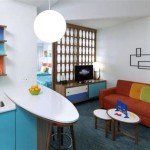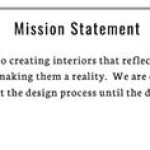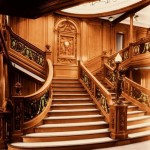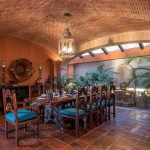Interior Design Firms in DC: Navigating the Capital's Aesthetic Landscape
Washington, D.C., a city steeped in history and simultaneously embracing modern innovation, presents a unique landscape for interior design. The diverse architectural styles, from stately federal-era homes to contemporary condominiums, demand design firms with a sophisticated understanding of both heritage and forward-thinking aesthetics. This article explores the key considerations when selecting an interior design firm in DC and highlights the qualities that distinguish leading firms in the region. It also delves into specific areas of expertise and project types, offering a comprehensive overview for those seeking to enhance their living or working spaces.
Choosing the right interior design firm is a pivotal decision. The firm selected will be responsible for translating a client's vision into a tangible reality, managing budgets, coordinating with contractors, and ultimately creating a space that reflects the client's individual needs and preferences. The process requires careful evaluation of a firm's portfolio, experience, design philosophy, and ability to communicate and collaborate effectively.
Understanding the Scope of Services
Interior design firms in DC offer a wide spectrum of services, ranging from conceptual design and space planning to project management and furniture procurement. It is crucial to understand the specific services a firm provides and to ensure that these services align with the project's requirements. Some firms specialize in residential design, while others focus on commercial projects, such as office spaces, restaurants, or retail establishments. Certain firms may offer specialized services like sustainable design, accessibility design, or historic preservation.
Full-service firms typically handle every aspect of a project, from initial consultations and design development to construction management and final installation. This comprehensive approach can be advantageous for clients seeking a turnkey solution and minimal involvement in the day-to-day details. Other firms may offer à la carte services, allowing clients to select only the services they need. This option can be more cost-effective for smaller projects or for clients who prefer to manage certain aspects of the project themselves.
Before engaging a design firm, it is essential to have a clear understanding of the project's scope, timeline, and budget. This information will help the firm to assess its suitability for the project and to provide an accurate estimate of fees and services. A detailed scope of work document should outline the project's goals, deliverables, and responsibilities of both the client and the design firm.
Many firms offer preliminary consultations to discuss the project and assess compatibility. This initial meeting provides an opportunity for the client to learn more about the firm's approach, ask questions, and determine whether there is a good fit in terms of personality, communication style, and design sensibilities. It also allows the firm to gain a better understanding of the client's vision and to offer initial recommendations.
Evaluating Design Philosophy and Portfolio
Each interior design firm operates with a unique design philosophy, reflecting the firm's values, aesthetic preferences, and approach to problem-solving. Some firms embrace a minimalist aesthetic, focusing on clean lines, neutral colors, and functional design. Others may favor a more maximalist approach, incorporating bold patterns, vibrant colors, and eclectic furnishings. Still other firms might specialize in specific styles, such as traditional, modern, or contemporary design.
A firm's portfolio serves as a visual representation of its design philosophy and capabilities. By reviewing a firm's past projects, clients can gain a sense of the firm's style, attention to detail, and ability to create cohesive and aesthetically pleasing spaces. It is important to look for projects that are similar in style and scope to the client's own project. The portfolio should demonstrate the firm's ability to work within different budgets and constraints and to adapt its design approach to meet the unique needs of each client.
When evaluating a portfolio, it is also helpful to consider the quality of the materials and finishes used, the attention to detail in the construction and installation, and the overall flow and functionality of the space. A well-designed space should not only be visually appealing but also be comfortable, practical, and conducive to the intended use.
In addition to reviewing the portfolio, it is beneficial to read client testimonials and reviews. These testimonials can provide valuable insights into the firm's professionalism, communication skills, and ability to deliver results that meet or exceed client expectations. Online platforms like Houzz, Yelp, and Google Reviews can offer a wealth of information about a firm's reputation and customer service.
The design philosophy also extends to the firm's sourcing practices. Some firms prioritize sustainable and eco-friendly materials, while others focus on supporting local artisans and businesses. Understanding a firm's sourcing practices can help clients to align their project with their own values and to create a space that is both beautiful and responsible.
Considering Experience and Expertise
The experience and expertise of an interior design firm are critical factors to consider when making a selection. Firms with a long track record of success have likely encountered and overcome a wide range of challenges, giving them the knowledge and skills to navigate complex projects effectively. Experienced firms also have established relationships with contractors, suppliers, and other industry professionals, which can streamline the design and construction process.
Beyond general experience, it is important to consider the firm's specific areas of expertise. Some firms may specialize in certain types of projects, such as kitchen and bath renovations, home theaters, or commercial office spaces. Other firms may have expertise in specific design styles, such as contemporary, traditional, or mid-century modern. Choosing a firm with relevant expertise can help to ensure that the project is executed with precision and attention to detail.
The qualifications and certifications of the firm's designers are also important considerations. Many interior designers hold professional certifications, such as the National Council for Interior Design Qualification (NCIDQ) certification, which demonstrates their competency and adherence to industry standards. It is also beneficial to inquire about the designers' education and training, as well as their ongoing professional development.
A well-established firm will typically have a team of designers with diverse backgrounds and skill sets. This diversity can be a valuable asset, as it allows the firm to approach projects from multiple perspectives and to generate innovative and creative solutions. The team should include designers with expertise in areas such as space planning, color theory, material selection, and project management.
Firms operating in the DC area must also be familiar with local building codes and regulations, as well as any historical preservation guidelines that may apply. A knowledgeable firm can help clients to navigate these requirements and to ensure that their project is compliant with all applicable laws and regulations.
In conclusion, selecting an interior design firm in DC requires careful consideration of various factors. Understanding the scope of services, evaluating design philosophy and portfolio, and considering experience and expertise are crucial steps in finding the right partner to transform a vision into reality. By carefully evaluating these factors, clients can find a firm that aligns with their needs, preferences, and budget, resulting in a space that is both beautiful and functional.

Mintz D C Projects Gensler

Hotel Interior Design Firm Yours Truly Dc Ktgy Architecture Branding Interiors Planning

10 Top Dc Interior Designers Near Me Decorilla Design

Mintz D C Projects Gensler

Hartman Design Group An Eye For Detail

Hartman Design Group An Eye For Detail

Page One Of Largest Dc Area Architecture Firms Pagethink Com

Mintz D C Projects Gensler

Hartman Design Group An Eye For Detail

Interior Design Firm Boston Dc Luxury Contemporary Designer








